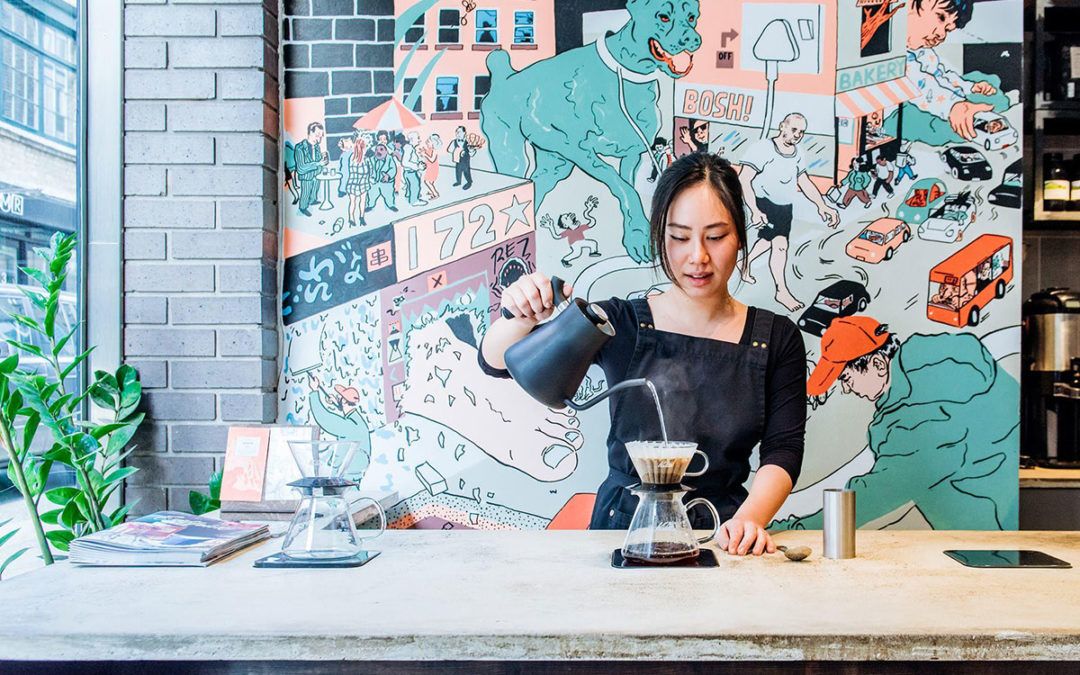In recent years we have moved from a nation of tea drinkers to a nation of coffee lovers and aficionados. Coffee culture has exploded across the UK and consumers have a breadth of choices for the coffee they enjoy drinking, both at home and on the high street.
In fact, coffee contributes £17.7 billion to the UK economy and helps support 210,325 jobs, according to market intelligence company Mintel.
Following last week’s UK Coffee Week, a nationwide celebration of coffee that sees coffee shops across the UK raise money for Project Waterfall – a charitable initiative bringing clean water, education and sanitation to coffee-growing communities – we decided to take a closer look at the facts and figures around the market.
Production
Coffee is one of the most widely consumed hot beverages worldwide with around 500 billion cups consumed every day, according to the British Coffee Association. It’s produced in more than 50 countries, with Brazil, the top coffee producing country, accounting for 40% of the global coffee supply. Vietnam, is the second largest coffee producer, accounting for roughly 20 percent of the world coffee production.

Source: Statista
The coffee trade is one of Brazil’s most prolific industries, thanks to an ideal climate and the large sections of land dedicated to growing. In 2014, about two million hectares of agricultural land was allotted for harvesting green coffee and more three million sacks of Brazilian coffee were exported in December 2016 alone.
Consumer behaviour
In the UK, people drink 95 million cups of coffee per day – an increase of 25 million over the last ten years, according to the Centre for Economics and Business Research. 65% is drunk at home, 25% at work or while studying, and the rest is consumed in shops, bars and restaurants.
While 80% of UK households prefer to buy instant coffee for in-home consumption, particularly those aged 65 and older, roast and ground coffee, and single-serve coffee pods are becoming increasingly popular, particularly amongst Millennials who account for 16% of all buyers (British Coffee Association).
On the high street, café culture continues to boom, 80% of people who visit coffee shops do so at least once a week, whilst 16% of us visit on a daily basis.
A challenge for brands, according to the British Coffee Association (BCA) is tapping into the younger end of the market, who are turning away from instant coffee, saying “long term growth in the market will very much depend upon how coffee brands can make coffee drinking appealing to a younger audience”.
Globally, The Netherlands tops the list of global coffee consuming countries followed by Finland, Canada and Sweden (Statista).
Sustainability
Sustainability has become a buzz word in recent years, but the long-term economic, environmental, and social health of the coffee industry are vital considerations for those in the industry. Reduced biodiversity and farmers living in poverty are just some of the issues involved.
In its sustainability mission, the British Coffee Association says it aims for zero-waste packaging by 2025, with the aim of switching to 100% recyclable or re-usable packaging across all products within the next seven years with 0% of waste going to landfill.
It also encourages manufacturers to:
- Responsibly source of all packaging materials – including plastic, paper, cardboard, and aluminium through enhanced supply chain transparency, traceability and investment in technologies that reduce waste to landfill.
- Conduct lifecycle assessments (LCAs) across their supply chains to identify opportunities to create efficiencies, minimise waste and potential to improve circularity.
- Improve transparency in labelling and on-pack recycling information.
- Create of digital technology such as recycling apps and other tools to educate and inspire consumers to change their behaviour around the use, re-use and recycling of materials in their daily coffee products.
Encouraging the adoption of the circular economy principles in the production and processing stages at origin, as a way of supporting coffee producers’ efforts to adapt to and mitigate the negative impacts of climate change while helping to reduce the environmental impact of coffee farming.
Ceuta’s Business Development Director says: “The UK continues to see coffee growth fuelled by the continuing rise of the coffee shop revolution, with over 24 billion cups consumed in the UK alone. As mainstream recognisable coffee brands are innovating, newly crafted and artisan coffee founders are innovating and challenging the status quo. Around the world ‘cold’ coffee is growing as we see more and more cold hot drinks as a key driver to category growth.
“Consumer tastes and preferences continue to change as we see this new dynamic growth in coffee consumption. Ceuta understands the challenges for both major brands and start-ups to win in this market. If you would like to hear more from our team on our experience in this sector please contact Ceuta Group.”

